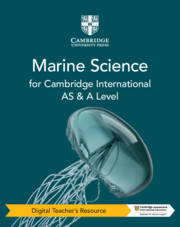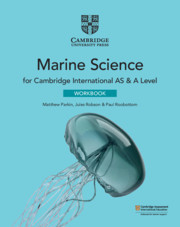Cambridge International AS & A Level Marine Science Digital Coursebook (2 Years)
Overview
Following extensive classroom research, this Coursebook has been revised to help students explore the wonders of the underwater world. Written in accessible language for the international learner this book helps students develop essential skills. Extended international case studies take you to the heart of marine ecosystems, with discussion questions that help students apply their knowledge and dive deeper into real-world contexts. Projects give students the opportunity to work collaboratively to explore and present topics. Exam-style questions encourage students to track their understanding with dedicated support for exam command terms.
Features
- Supports the theoretical aspects of the course as well as application of knowledge, promotion of scientific enquiry and independent learning
- Essential practical activities and a new practical chapter develop investigative skills
- Group project activities such as creating scale models of marine ecosystems develop collaborative skills
- Extended international case studies with discussion questions help students apply knowledge and learn more about real-world contexts
- Maths skills for science feature contains background information, worked examples and practice questions that help students to develop the mathematical awareness required for the course
- Exam command term definitions and advice are provided in a new feature page at the start of the coursebook and incorporated frequently in assessment questions
- Key terms with clear and straightforward definitions of important scientific and academic terms when they first appear
- Reflection questions and activities at the end of projects and practical activities encourage students to understand and improve the way they learn
- Exam-style questions at the end of each chapter and in-chapter questions help students track their understanding
- Answers to all questions are provided in the Digital Teacher’s Resource
Contents
- How to use this series
- How to use this book
- Introduction
- Introduction to command words
- Chapter 1: Water
- 1.1 Particle theory and bonding
- 1.2 Solubility in water
- 1.3 Density and pressure
- Chapter 2: Earth processes
- 2.1 Tectonic processes
- 2.2 Weathering, erosion and sedimentation
- 2.3 Tides and ocean currents
- Chapter 3: Interactions in marine ecosystems
- 3.1 Interactions
- 3.2 Feeding relationships
- 3.3 Nutrient cycles
- Chapter 4: Classification and biodiversity
- 4.1 The classification of marine organisms
- 4.2 Key groups of marine organisms
- 4.3 Biodiversity
- 4.4 Populations and sampling techniques
- Chapter 5: Examples of marine ecosystems
- 5.1 The open ocean
- 5.2 The tropical coral reef
- 5.3 The rocky shore
- 5.4 The sandy shore
- Practical skills
- 1 Experimental planning including making estimates, predictions and hypotheses
- 2 Presentation of data and observations
- 3 Evaluation of procedures and data
- 4 Analysis of data and conclusions
- Chapter 6: Physiology of marine organisms
- 6.1 General cell structure
- 6.2 Movement of substances
- 6.3 Gas exchange
- 6.4 Osmoregulation
- Chapter 7: Energy
- 7.1 Photosynthesis
- 7.2 Chemosynthesis
- 7.3 Respiration
- Chapter 8: Fisheries for the future
- 8.1 Life cycles
- 8.2 Sustainable fisheries
- 8.3 Marine aquaculture
- Chapter 9: Human impacts on marine ecosystems
- 9.1 Ecological impacts of human activities
- 9.2 Global warming and its impact
- 9.3 Ocean acidification
- 9.4 Conservation of marine ecosystems
- Glossary
- Index
Brighter Thinking Blog
Keep up to date with the latest classroom tips and educational trends from our brighter thinkers.
Visit the blogCatalogues and Ordering
Looking for something in particular or just browsing? View our catalogues to see our full range of print and digital books.
View and downloadAdvice on useful tools
Advice on useful tools, activities and timetabling from teachers experiencing school closures.
Cambridge GO
All our supporting resources have now moved to Cambridge GO – the new home for your Cambridge digital content.
Listen to our podcast
Listen to our podcast to discover teaching inspiration & advice from leading educational thinkers.






